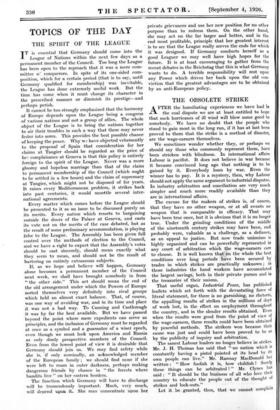TOPICS OF THE DAY
THE SPIRIT OF THE LEAGUE IT is essential that Germany should come into the League of Nations within the next few days as a permanent member of the Council. Too long the League has been open to the reproach that it was a mere com- mittee o" conquerors. In spite of its one-sided com- position, which for a certain period (that is to say, until Germany qualified for membership) was inevitable, the League has done extremely useful work. But the time has come, when it must change its character in the prescribed manner or diminish its prestige—and perhaps perish.
It cannot be too strongly emphasized that the harmony of Europe depends upon the League being a congress of various nations and not a group of allies. The whole object of the League is to bring the nations together to air their troubles in such a way that these may never fester into sores. This provides the best possible chance of keeping the peace. Why we have objected vehemently• to the proposal of Spain that consideration for her claims at Tangier should be regarded as the price of her complaisance at Geneva is that this policy is entirely foreign to the spirit of the League. Never was a more gloomy and hopeless marriage than that of the claim to permanent membership of the Council (which ought to be settled in a few hours) and the claim of supremacy at Tangier, which might not be disposed of for years. It raises every Mediterranean problem, it strikes back into past centuries, it would unsettle several inter- national agreements.
Every matter which comes before the League should be presented to it as an issue to be discussed purely on its merits. Every nation which resorts to bargaining outside the doors of the Palace at Geneva, and casts its vote not on the merits of the case debated, but as the result of some preliminary accommodation, is playing false to the League. The Assembly has been given full control over the methods of election to the Council, and we have a right to expect that the Assembly's votes should be cast sincerely, should mean exactly what they seem to mean, and should not be the result of bartering on entirely extraneous subjects.
If, as we hope and believe will happen, Germany alone becomes a permanent member of the Council next week, we shall have brought somebody in from "the other side." This act should mean the end of the old arrangement under which the Powers of Europe sorted themselves very definitely into rival groups which held an almost exact balance. That, of course, was one way of avoiding war, and in its time and place it was not a bad way. To Canning and Castlereagh it was by far the best available. But we have passed beyond the point where mere expedients can serve as principles, and the inclusion of Germany must be regarded at once as a symbol and a guarantee of a wiser epoch, even though we must look upon America and Russia as only dimly prospective members of the Council. Even from the lowest point of view it is desirable that Germany should join us. We may find safety while she is, if only nominally, an acknowledged member of the European family ; we should find none if she were left to roam in outer darkness, perhaps making dangerous friends by chance in "the forests where bandits live" on her eastern borders.
The function which Germany will have to discharge will be tremendously important. Much, very much, will depend upon it. She may concentrate upon her private grievances and use her new position for no other purpose than to redress them. On the other hand, she may act on the far larger and better, and in the end most profitable, principle that her greatest interest is to see that the League really serves the ends for which it was designed. If Germany conducts herself as a good Leaguer we may well have high hopes for the future. It is at least encouraging to gather from the recent debates in the Reichstag that this is what Germany wants to do. A terrible responsibility will rest upon any Power which drives her back upon the old con. viction that the greatest advantages are to be obtained by an anti-European policy.


































 Previous page
Previous page